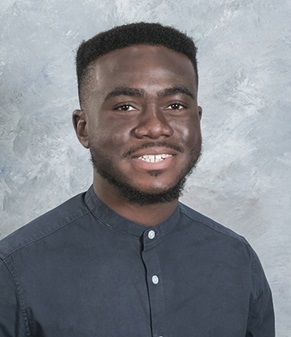
Celebrating Black Excellence at Home and Abroad
To kick off Black History Month, two members of IFT’s Member Resource Groups share their stories as food scientists in the African diaspora and how success motivates them to give back.

Originally from Nigeria, Ikechukwu Oguadinma came to the United States in 2017 to complete his graduate studies, earning both a master’s degree and a PhD in food science from the University of Georgia. Barbados-born Cheryl Rock arrived in 2004, completing her undergraduate and master’s degrees at Alabama A&M before earning a PhD from the University of Florida.
Both have launched successful food science careers in their new country, yet neither has strayed far from their roots. Now a research scientist at the Boston-based food tech startup Mori, Oguadinma never misses an opportunity to help international students like him find their way. An associate professor of food science and technology at California State University, Long Beach, Rock returns to Barbados each year with her college students—not only to study food science but to teach about her culture.
During Black History Month, we celebrate their stories and the richness those of African descent bring to the science of food. Read on to learn more about them.
Ikechukwu Oguadinma, PhD
How did you get interested in food science?
My parents are both commercial retail pharmacists in Nigeria, and from a young age I worked closely with my mum at her practice. Over time, I observed that the key to the resolution of certain health conditions hinged on diet or lifestyle changes. Initially, I wanted to study medicine but after an enlightening conversation with Distinguished Research Professor Casimir Akoh at the University of Georgia, I decided on food science. It seemed like an excellent path to influence health outcomes.
Describe your current role and research interests.
I work as a research scientist at Mori, a Boston-based food tech startup dedicated to building a more resilient and sustainable food space by unlocking the power of silk protein to extend food shelf life. I apply my expertise in food microbiology to understand fundamental silk-food spoilage microbe interaction. Prior to joining Mori, I worked on several food safety projects at the University of Georgia Center for Food Safety. For my PhD dissertation, I studied antimicrobial resistance in pathogenic E. coli specifically investigating the concept of antimicrobial cross tolerance. Foodborne pathogens are regularly implicated in several cases of foodborne outbreaks and food recalls. I am passionate about making a difference in this area.
Talk about your involvement with IFT’s Member Resource Groups.
I joined IFT’s Early Careerist group as one of its premier members. I volunteer with the international support committee to establish connections and collaborations with international members and partners and provide resources for career development on a global scale. I try to be a resource for anyone seeking to get admitted into U.S. universities and strive to help international students like me navigate professional life in the food industry.
What does Black excellence in food science mean to you?
It simply means the demonstration of ability, achievement, and success by individuals of Black or African descent. It means increased Black community representation on food company executive boards, as food scientists, food product designers, leaders in quality and food safety, decision makers for regulatory bodies, and thought leaders in the science of food. People of African descent are passionate, hardworking, and resilient. These traits, coupled with a strong “can-do” mindset, uniquely position us to get the work done and become global leaders.
Cheryl Rock, PhD
Was there a pivotal moment when you knew food science was the field for you?
My pivotal moments were a result of my positive experiences as a student in IFTSA’s College Bowl and Alabama A&M’s Food Science Club, early exposure to undergraduate research with my advisor and mentor [at Alabama A&M] Dr. Martha Verghese, as well as successful participation in the IFT undergraduate research competitions at IFT’s Food and Science Expo. My connection to IFT has continued ever since. I have served on the board of the African, African American, Black Resource Group since 2021 and am currently the chair of its learning and development committee.
Describe your research interests.
My research involves examining mechanisms of disease mitigation through plant-based approaches in native foods, for example studying the ethnomedical properties of mauby bark, a popular plant material used to make a beverage in Barbados and the wider Caribbean. I have characterized several compounds in mauby bark that are of importance, and the results have been published in the Journal of Food Research. Other areas of interest include novel food processing technologies, metaphysical principles of food, and pedagogical development of food science curricula using the Kolb Experiential Learning Model.
How have you stayed connected to your home country and roots?
I have facilitated a short-term study abroad course to Barbados, the birthplace of rum, each year since 2017. The course is titled “Distilling and Brewing Technology in Barbados,” and CSULB students join me to learn about rum science and its intersection with ancestral African and modern Barbadian culture and spiritual traditions. The course promotes global diversity, equity, and inclusion efforts; fosters professional academic success in food science beyond textbooks and the traditional classroom setting; and helps students develop cultural competency. The class has also been a catalyst for my research. Over the years, I have been able to document my cultural heritage, the distinct geological features of Barbados for rum production, major historical figures, and rum celebration. As a result, I am able to educate readers about the global dynamics of the diasporan experience interconnecting Africa, the Caribbean, and the United States.
What does Black excellence in food science mean to you?
I strive to extinguish stereotypes in academia by being a role model in spaces that are deemed impenetrable and advancing social equity. As part of the International Education Committee at CSULB, I promote programs that provide students exposure to the global environment through food and culture related to the African continent and make them aware of internship and educational programs in Africa. I am the author of four food science-related books. But I am also a first-degree black belt in martial arts and a violinist. I enjoy humanizing aspects of myself to my students, so they can see that I am not just a collection of degrees and research publications. To me, Black excellence means striving to be an empowered Black woman who empowers others.
IFT’s African, African American, Black Resource Group (AAABRG) will host two events for Black History Month 2024 to honor African, African American, and Black contributions to advancing the global food system. Join us for Heritage Foods, Health, and Nutrition in the African Diaspora on February 6, from 11 a.m.-12 p.m. CT, and attend AAABRG’s first Member Meetup on February 22, 11 a.m.-12 p.m. CT with guest speaker Bryson Bolton, director of strategic growth at Compusense. Click here to join the AAABRG’s Connect Community.
